Vivek Subbiah, Chief of Early-Phase Drug Development at the Sarah Cannon Research Institute, shared some top articles.
1. “Hot off the press, published in the New England Journal of Medicine around the IASLC FOUNDATION world lung meeting.
Overall Survival with Amivantamab – Lazertinib in EGFR-Mutated Advanced NSCLC, New England Journal of Medicine.
In advanced non-small-cell lung cancer with EGFR mutations, amivantamab-lazertinib led to longer overall survival than osimertinib but was associated with an increased risk of adverse events of grade 3 or higher.”
Title: Overall Survival with Amivantamab–Lazertinib in EGFR-Mutated Advanced NSCLC
Journal: NEJM
Authors: James Chih-Hsin Yang, Shun Lu, Hidetoshi Hayashi, Enriqueta Felip, Alexander I. Spira, Nicolas Girard, Yu Jung Kim, Se-Hoon Lee, Yurii Ostapenko, Pongwut Danchaivijitr, Baogang Liu, Adlinda Alip, Ernesto Korbenfeld, Josiane Mourão Dias, Benjamin Besse, Antonio Passaro, Ki-Hyeong Lee, Hailin Xiong, Soon-Hin How, Ying Cheng, Gee-Chen Chang, Hiroshige Yoshioka, Michael Thomas, Danny Nguyen, Sai-Hong Ignatius Ou, Sanjay Mukhedkar, Kumar Prabhash, Manolo D’Arcangelo, Jorge Alatorre-Alexander, Juan Carlos Vázquez Limón, Sara Alves, Daniil Stroyakovskiy, Marina Peregudova, Mehmet Ali Nahit Şendur, Ozan Yazici, Raffaele Califano, Vanesa Gutiérrez Calderón, Filippo de Marinis, Sang-We Kim, Shirish M. Gadgeel, Scott Owen, John Xie, Tao Sun, Jaydeep Mehta, Raja Venkatasubramanian, Mariah Ennis, Elizabeth Fennema, Mahesh Daksh, Amy Roshak, Julie Man, Roland E. Knoblauch, Joshua M. Bauml, Mahadi Baig, Sujay Shah, Seema Sethi, and Byoung Chul Cho
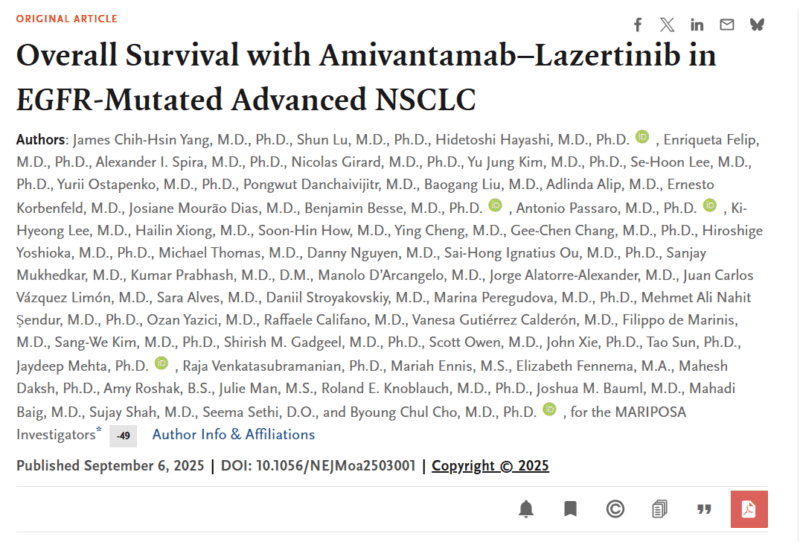
2. “Interesting paper published Nature Magazine on resistance mechanisms to immunotherapy.
Cancer-induced nerve injury promotes resistance to anti-PD-1 therapy. Would be interesting to see how we could translate this to the clinic.”
Title: Cancer-induced nerve injury promotes resistance to anti-PD-1 therapy
Journal: Nature
Authors: Erez N. Baruch, Frederico O. Gleber-Netto, Priyadharsini Nagarajan, Xiayu Rao, Shamima Akhter, Tuany Eichwald, Tongxin Xie, Mohammad Balood, Adebayo Adewale, Shorook Naara, Hinduja N. Sathishkumar, Shajedul Islam, William McCarthy, Brandi J. Mattson, Renata Ferrarotto, Michael K. Wong, Michael A. Davies, Sonali Jindal, Sreyashi Basu, Karine Roversi, Amin Reza Nikpoor, Maryam Ahmadi, Ali Ahmadi, Catherine Harwood, Irene Leigh, Dennis Gong, Paulino Tallón de Lara, Derrick L. Tao, Tara M. Davidson, Nadim J. Ajami, Andrew Futreal, Kunal Rai, Veena Kochat, Micah Castillo, Preethi Gunaratne, Ryan P. Goepfert, Sharia D. Hernandez, Nikhil I. Khushalani, Jing Wang, Stephanie S. Watowich, George A. Calin, Michael R. Migden, Mona Yuan, Naijiang Liu, Yi Ye, William L. Hwang, Paola D. Vermeer, Nisha J. D’Silva, Yuri L. Bunimovich, Dan Yaniv, Jared K. Burks, Javier Gomez, Patrick M. Dougherty, Kenneth Y. Tsai, James P. Allison, Padmanee Sharma, Jennifer A. Wargo, Jeffrey N. Myers, Sebastien Talbot, Neil D. Gross, Moran Amit
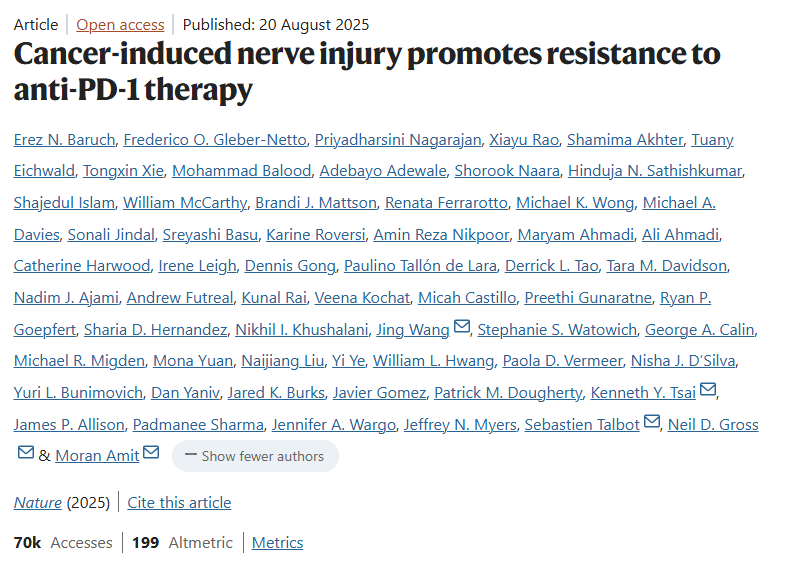
3. “New in Nature: Compression isn’t just uncomfortable – it can make cancer cells spread.
In zebrafish skin cancer, mechanical squeezing by nearby tissues flips cells from ‘grow’ to ‘go,’ triggering invasion.
The microenvironment isn’t passive, it’s a powerful reprogrammer.”
Title: Mechanical confinement governs phenotypic plasticity in melanoma
Journal: Nature
Authors: Miranda V. Hunter, Eshita Joshi, Sydney Bowker, Emily Montal, Yilun Ma, Young Hun Kim, Zhifan Yang, Laura Tuffery, Zhuoning Li, Eric Rosiek, Alexander Browning, Reuben Moncada, Itai Yanai, Helen Byrne, Mara Monetti, Elisa de Stanchina, Pierre-Jacques Hamard, Richard P. Koche, Richard M. White
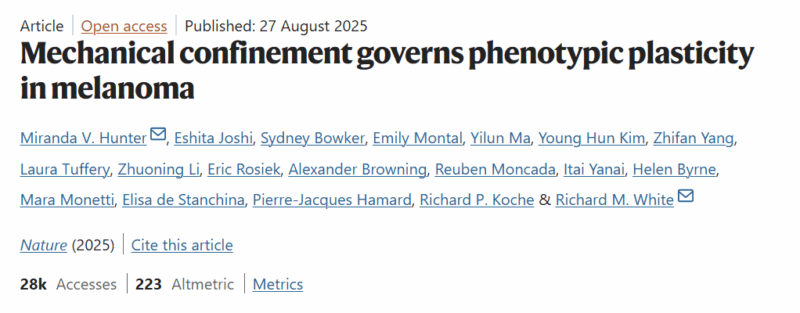
4. “Interesting paper published in Nature shows How aggressive brain tumours exploit glucose to suppress normal physiological activity in favour of malignant expansion and offer potential therapeutic strategies to enhance treatment outcomes.”
Title: Rewiring of cortical glucose metabolism fuels human brain cancer growth
Journal: Nature
Authors: Andrew J. Scott, Anjali Mittal, Baharan Meghdadi, Alexandra O’Brien, Justine Bailleul, Palavalasa Sravya, Abhinav Achreja, Weihua Zhou, Jie Xu, Angelica Lin, Kari Wilder-Romans, Ningning Liang, Ayesha U. Kothari, Navyateja Korimerla, Donna M. Edwards, Zhe Wu, Jiane Feng, Sophia Su, Li Zhang, Peter Sajjakulnukit, Anthony C. Andren, Junyoung O. Park, Johanna ten Hoeve, Vijay Tarnal, Kimberly A. Redic, Nathan R. Qi, Joshua L. Fischer, Ethan Yang, Michael S. Regan, Sylwia A. Stopka, Gerard Baquer, Krithika Suresh, Jann N. Sarkaria, Theodore S. Lawrence, Sriram Venneti, Nathalie Y. R. Agar, Erina Vlashi, Costas A. Lyssiotis, Wajd N. Al-Holou, Deepak Nagrath, Daniel R. Wahl
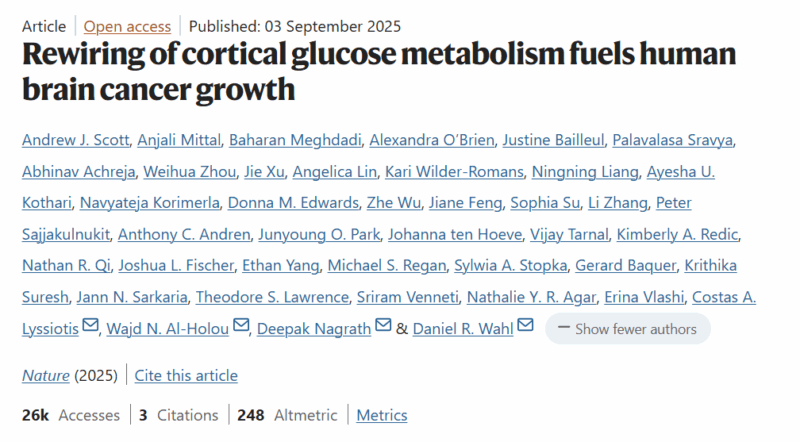
5. “Oncogenic KRAS is a hallmark of pancreatic cancer, one of the deadliest malignancies, and inhibition of oncogenic KRAS alone is, in most patients, not sufficient to eradicate the tumor.
Drugging KRAS is one of the hottest topics in oncology.
The two studies published in Cancer Discovery by Stanger and colleagues and Lowe and colleagues propose combination therapy approaches to leverage the power of the immune system, together with KRAS inhibition, to achieve long-term remission.”
Title: Two Shots on Goal: Combination of RAS Inhibition and Immunotherapy Drives Long-term Remission in Pancreatic Cancer
Journal: Cancer Discovery
Authors: Emily L. Lasse Opsahl, Marina Pasca di Magliano
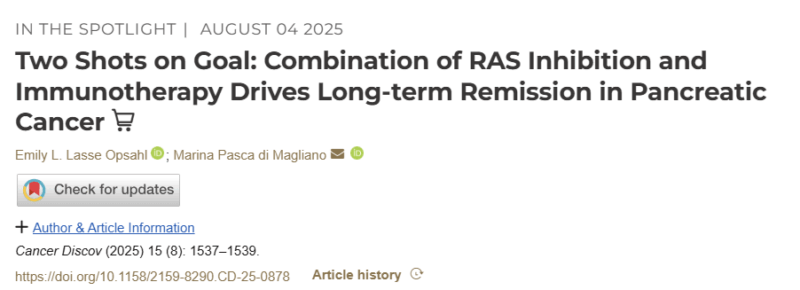
More from Vivek Subbiah on OncoDaily.


